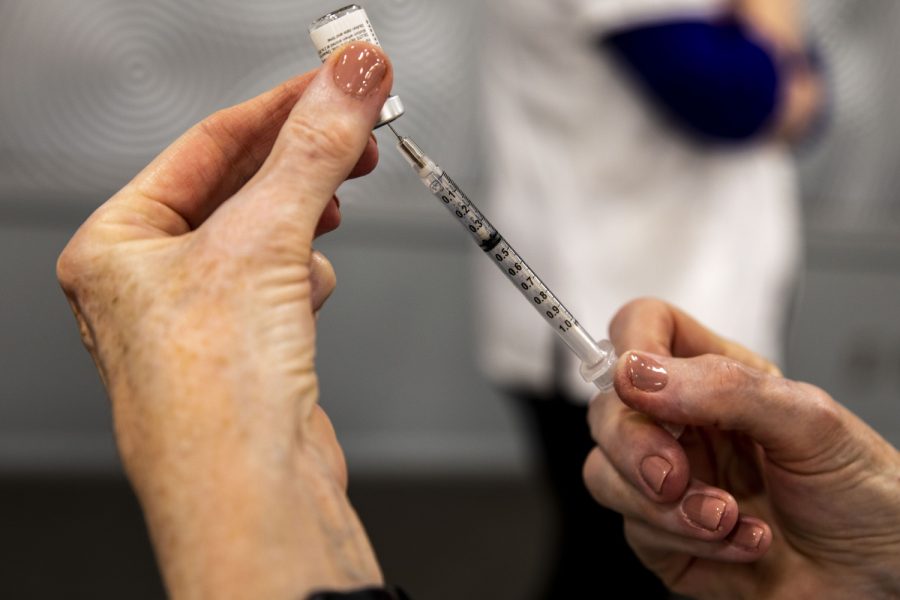Doc is In | COVID-19 Vaccines: Staying informed
As the COVID-19 pandemic enters its fourth year, many Americans are still left with questions about the COVID-19 vaccines and their safety.
A Pfizer vaccine is drawn up during a vaccination clinic at the Radisson Hotel Conference Center in Coralville on Wednesday, April 14, 2021.
April 2, 2023
Some Americans are still left with questions about the COVID-19 vaccines and their safety as the COVID-19 pandemic enters its fourth year.
The approval of the bivalent booster and the constant emergence of new variants only serves to increase confusion. Staying informed about the current COVID-19 protocols regarding vaccination is one of the best ways to ensure health safety during this time.
What is the COVID-19 vaccine?
The COVID-19 bivalent vaccine provides additional immunity against both the original COVID-19 virus and omicron subvariants BA.4 and BA.5. The subvariants were the dominant sub variants in the U.S. from July until October 2022. Currently, the dominant subvariant in the U.S. is XBB.1.5. The monovalent vaccine refers to the original COVID-19 vaccine that includes the original virus.
Current Centers for Disease Control guidelines recommend a bivalent booster dose at least two months after completing the primary series or receiving the monovalent booster dose. Despite CDC data indicating that about 73 percent of people five years old or older have completed the primary dose series, only about 16 percent (42.8 million people) of Americans received the bivalent booster.
Do COVID-19 vaccines work?
As we begin to explore the effectiveness of the bivalent booster, readers should keep in mind the purpose of most viral vaccines. The COVID-19 vaccine is intended to prevent hospitalization and death.
A study conducted in September-November 2022 provides early estimates of bivalent vaccine effectiveness. The study looked at healthy adults and found the bivalent booster dose reduced the amount of emergency department or urgent care visits and hospitalizations by over 50 percent. It should be noted that this study was conducted before XBB.1.5 became the dominant COVID-19 strain. This study shows that all patients can benefit from a bivalent booster.
What are common side effects of these vaccines?
Post-vaccination symptoms, such as fever, headache, fatigue, and sore arm, can occur after standard vaccinations are given. These can be minimized by getting rest, drinking plenty of fluids, and taking Tylenol or Advil after being vaccinated. Symptoms should go away in 1-2 days.
Are there any risks to vaccination?
There are some rare risks to getting a COVID-19 vaccination that people should also be aware of. There have been reports of myocarditis (inflammation of the heart muscle) and pericarditis (inflammation of the lining of the heart) associated with the COVID-19 vaccinations, most commonly in young men ages 19-39.
Risk of either occurring increases with each dose received. Increasing the interval between the two primary doses can help reduce this risk. Myocarditis is said to occur within one week after vaccination and may be discovered by any of the following: chest pain, shortness of breath, and fast-beating, fluttering, or pounding of heart.
The Vaccine Adverse Event Reporting System reports of myocarditis in young men from 12 to 24 years old are currently documented on the CDC website:
- 12-15 years of age: 70.7 cases per 1 million vaccinations
- 16-17 years of age: 105.9 cases per 1 million vaccinations
- 18-24 years of age: 52.4 cases per 1 million vaccinations
These are reports due to Pfizer-BioNTech vaccination alone. Therefore, there are most likely equivalent if not more reports due to the Moderna vaccination. This information was taken from December 2020-August 2021 in which 350 million vaccinations were given.
Though there can be side effects of vaccines, the CDC states the benefits outweigh the negatives of getting vaccinations for anybody above older than 6 years old.
- Jill Guetersloh, she/her/hers, 3rd-year Pharmacy Student, Class of 2024
- Taylor Streck, she/her/hers, 2nd-year Pharmacy Student, Class of 2025
Columns reflect the opinions of the authors and are not necessarily those of the Editorial Board, The Daily Iowan, or other organizations in which the author may be involved.













